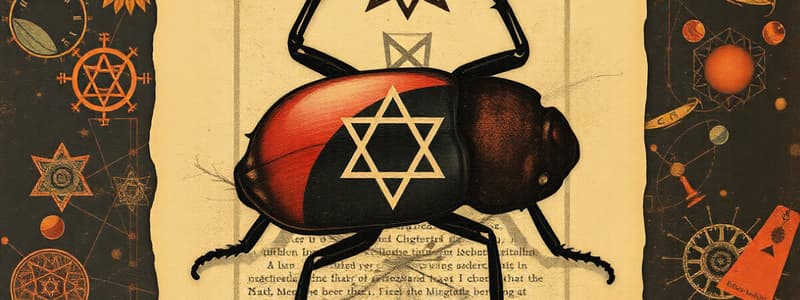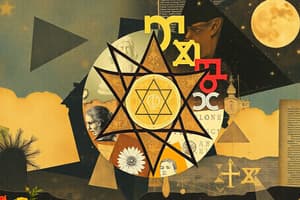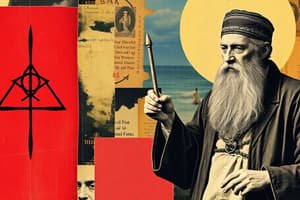Podcast
Questions and Answers
What was Moisha the Beetle known for in Seget?
What was Moisha the Beetle known for in Seget?
- His outspoken nature and participation in town debates
- His wealth and influence in the community
- His expertise in carpentry and woodworking
- His shyness and ability to appear insignificant (correct)
What subject did the narrator yearn to study, despite his father's discouragement?
What subject did the narrator yearn to study, despite his father's discouragement?
- Advanced mathematics at the local university
- Kabbalah, a tradition of Jewish mysticism (correct)
- Ancient Greek philosophy and rhetoric
- Astronomy and celestial navigation techniques
What did Moisha the Beetle teach the narrator about finding answers?
What did Moisha the Beetle teach the narrator about finding answers?
- Answers are found by reading many books.
- Real answers can be found within oneself. (correct)
- Answers are found through consultation with community elders.
- Answers are found through rigorous scientific experimentation.
According to Kabbalah, what is linked to the redemption of humanity?
According to Kabbalah, what is linked to the redemption of humanity?
What happened to the Jews who were expelled from Seget and placed on the train to Galicia?
What happened to the Jews who were expelled from Seget and placed on the train to Galicia?
Why did no one believe Moisha when he returned to Seget to tell his story?
Why did no one believe Moisha when he returned to Seget to tell his story?
What event was the narrator's family planning for in the Spring of 1944?
What event was the narrator's family planning for in the Spring of 1944?
What was the Gleason Forest known for?
What was the Gleason Forest known for?
What initial impression did the author have of the German officers upon their arrival in his town?
What initial impression did the author have of the German officers upon their arrival in his town?
What rationale was given by the Jewish council members to encourage acceptance of the ghettos?
What rationale was given by the Jewish council members to encourage acceptance of the ghettos?
What was the general attitude of the people within the ghetto regarding their situation?
What was the general attitude of the people within the ghetto regarding their situation?
What was the primary emotion felt by the community upon learning about the deportation order?
What was the primary emotion felt by the community upon learning about the deportation order?
What do Mrs. Schachter's screams of "fire" on the train symbolize?
What do Mrs. Schachter's screams of "fire" on the train symbolize?
What was the significance of the train arriving at a station called Kashau?
What was the significance of the train arriving at a station called Kashau?
Which of the following best describes the author's emotional state upon arrival at Auschwitz?
Which of the following best describes the author's emotional state upon arrival at Auschwitz?
The selection process at Auschwitz, led by Dr. Mengele, primarily determined:
The selection process at Auschwitz, led by Dr. Mengele, primarily determined:
What caused the author to feel an intense desire to run into the electrified barbed wire?
What caused the author to feel an intense desire to run into the electrified barbed wire?
What is the significance of the inmates reciting Kaddish?
What is the significance of the inmates reciting Kaddish?
Why were the prisoners forced to be shaved bald?
Why were the prisoners forced to be shaved bald?
What did the pile of clothes in the barracks symbolize?
What did the pile of clothes in the barracks symbolize?
What was the Sonderkommando?
What was the Sonderkommando?
Why was the author afraid of being separated from his father?
Why was the author afraid of being separated from his father?
What does it mean when the author says they were forced to become "meerkat" figures?
What does it mean when the author says they were forced to become "meerkat" figures?
What realization does the author come to after witnessing the Gypsy inmate's violence against his father?
What realization does the author come to after witnessing the Gypsy inmate's violence against his father?
What is the significance of the phrase 'Arbeit Macht Frei' at the entrance to Auschwitz?
What is the significance of the phrase 'Arbeit Macht Frei' at the entrance to Auschwitz?
Why did the author's father ask where the toilets were during the stay in the Gypsy camp?
Why did the author's father ask where the toilets were during the stay in the Gypsy camp?
What was the purpose of the roll call at dusk in Auschwitz?
What was the purpose of the roll call at dusk in Auschwitz?
How were prisoners identified after their arrival at Auschwitz?
How were prisoners identified after their arrival at Auschwitz?
What was the initial reaction of veteran inmates towards the new arrivals in Auschwitz, as evidenced by their actions the first morning?
What was the initial reaction of veteran inmates towards the new arrivals in Auschwitz, as evidenced by their actions the first morning?
Why does the author refuse to eat the soup upon arriving at Auschwitz?
Why does the author refuse to eat the soup upon arriving at Auschwitz?
Why did the author recognize Stein, the man who approached his father, while his father did not initially remember him?
Why did the author recognize Stein, the man who approached his father, while his father did not initially remember him?
What does the SS officer emphasize to the inmates upon arrival, according to the text?
What does the SS officer emphasize to the inmates upon arrival, according to the text?
What did the prisoners typically eat each day?
What did the prisoners typically eat each day?
Flashcards
Who was Moisha the Beetle?
Who was Moisha the Beetle?
Moisha was a shy and unassuming man who lived in Seget, Transylvania. He was nicknamed "Moisha the Beetle" because he blended into the background, making himself appear insignificant.
Who is the narrator?
Who is the narrator?
The narrator is a young Jewish boy from Seget, Transylvania in the 1940s. He focuses on his studies and observes the world around him, spending most days studying the Talmud and nights praying in the synagogue.
What is the connection between Moisha and the narrator?
What is the connection between Moisha and the narrator?
Moisha and the narrator met in Seget, Transylvania. The narrator was drawn to Moisha's insightful eyes and his deep knowledge of Kabbalah. Moisha taught the narrator the importance of asking questions, believing that true answers lie within oneself.
What is Kabbalah?
What is Kabbalah?
Signup and view all the flashcards
What happened to Moisha in the forest?
What happened to Moisha in the forest?
Signup and view all the flashcards
What happened when Moisha returned to Seget?
What happened when Moisha returned to Seget?
Signup and view all the flashcards
What key events happened in Seget during the years 1942-1944?
What key events happened in Seget during the years 1942-1944?
Signup and view all the flashcards
Father's Decline
Father's Decline
Signup and view all the flashcards
Author's Despair
Author's Despair
Signup and view all the flashcards
Inmate Grief
Inmate Grief
Signup and view all the flashcards
SS Officer's Message
SS Officer's Message
Signup and view all the flashcards
Moral Breakdown
Moral Breakdown
Signup and view all the flashcards
Auschwitz: Danger
Auschwitz: Danger
Signup and view all the flashcards
Irony of Freedom
Irony of Freedom
Signup and view all the flashcards
Hope in Despair
Hope in Despair
Signup and view all the flashcards
Arrival at Auschwitz
Arrival at Auschwitz
Signup and view all the flashcards
Daily Routine
Daily Routine
Signup and view all the flashcards
Initial Response to German Troops
Initial Response to German Troops
Signup and view all the flashcards
Shift in Opinion During Fascism
Shift in Opinion During Fascism
Signup and view all the flashcards
The Imposition of Ghettos
The Imposition of Ghettos
Signup and view all the flashcards
Normality's Illusion in the Ghetto
Normality's Illusion in the Ghetto
Signup and view all the flashcards
Role of the Jewish Council
Role of the Jewish Council
Signup and view all the flashcards
The Summons of Doom
The Summons of Doom
Signup and view all the flashcards
The Liquidation of the Ghetto
The Liquidation of the Ghetto
Signup and view all the flashcards
Dehumanization in the Cattle Cars
Dehumanization in the Cattle Cars
Signup and view all the flashcards
The Journey's Descent into Fear
The Journey's Descent into Fear
Signup and view all the flashcards
Mrs. Schachter's Screams of
Mrs. Schachter's Screams of
Signup and view all the flashcards
Family Separation at Auschwitz
Family Separation at Auschwitz
Signup and view all the flashcards
The Selection at Auschwitz
The Selection at Auschwitz
Signup and view all the flashcards
Dehumanization Upon Arrival
Dehumanization Upon Arrival
Signup and view all the flashcards
A Final Glimpse of Family
A Final Glimpse of Family
Signup and view all the flashcards
Study Notes
Moisha the Beetle
- Moisha was a poor man from Seget, Transylvania.
- He was called "Moisha the Beetle."
- He was shy and made himself seem unimportant.
The Narrator
- The narrator was a Jewish boy from Seget, Transylvania in the 1940s.
- He was observant, studying Talmud and praying in the synagogue.
- He wanted to study Kabbalah but his father thought he was too young.
Moisha and the Narrator
- The narrator met Moisha and was drawn to his wide, dreamy eyes.
- Moisha, a Kabbalah student, taught the narrator the importance of questions, believing answers are within.
Kabbalah
- Kabbalah is Jewish mysticism, understanding God through hidden Torah meanings.
- The Shekinah (feminine aspect of God) is in exile, and its redemption links to humanity's.
Moisha's Story
- Moisha and many other Jews were expelled from Seget, transported to a train for Galicia, Poland.
- The Gestapo took over the train, forcing Jews off onto trucks.
- They were driven to a forest, ordered to dig trenches, and then shot by the Gestapo.
- Moisha survived due to a wound, being left for dead.
Moisha's Return
- Moisha returned to Seget to warn Jews about the dangers.
- His warnings were not believed; people thought he was mad or seeking pity.
- Moisha was heartbroken and felt alone.
The Years 1942-1944
- 1942: Moisha told the narrator about the Gleason Forest massacre.
- 1943: Life in Seget seemed relatively normal despite the war.
- 1944: Spring: The narrator’s family prepared for Hilda’s wedding.
The Arrival of the Germans
- Optimism existed about the Red Army and a belief that Hitler wouldn't harm them.
- The Jewish community, like the author's family, paid little attention to rising fascism in Hungary.
- German troops arriving caused unease and worry; initial politeness quickly escalated.
- Jewish community leaders were arrested, and restrictions increased.
Life in the Ghetto
- Two ghettos were established, confining Jews under strict regulations.
- Jewish council members encouraged ghetto acceptance, believing it offered community.
- Daily life in the ghetto appeared normal, focused on the belief of remaining there until the war's end.
- Despite outward calm, fear and anxiety remained persistent.
The Deportation Order
- The Jewish Council received a summons, signaling impending doom.
- The Council announced ghetto liquidation and forced deportation to unknown locations.
- Uncertainty and fear prevailed about labor camps and forced work.
- Frenzied packing of belongings and goodbyes occurred.
- Optimism for quick return remained despite the desperate situation.
The Journey by Train
- The journey was harrowing – crammed cattle cars, extreme heat, thirst, and threats.
- Mrs. Schachter lost her sanity, symbolizing the fear and despair.
- The train stopped at Kashau, adding humiliation and confiscation.
- Passengers were informed of deportation beyond Hungary, fostering extreme fear.
- The journey illustrated confinement and escalating threats with diminishing hopes.
Arrival at Auschwitz
- Arrival at Auschwitz caused dread – a place of unknown horror.
- Separation from mother and sister was a heart-wrenching experience.
- The arrival process was chaotic and dehumanizing, guided by SS officers.
- The permanent separation of family members took place.
Arrival at Auschwitz (Later Version)
- The author and his father, with other inmates, arrived at Auschwitz.
- A hostile SS officer threatened death at the crematorium, pointing to the flames in a nearby ditch.
- The inmates were terrified and stunned.
- The author felt dread and disbelief.
The Selection
- Inmates were taken to a clearing for selection by Dr. Mengele.
- Mengele used a baton to direct inmates, left or right.
- Inmates were relieved to stay together, whether left or right side.
- The author was separated from his mother, and his father was heartbroken.
- The author was destined for the crematorium.
Facing the Flames
- The author witnessed children thrown into the flames.
- The sheer horror and implications of the violence were incomprehensible.
- The silence of the world surrounding such atrocities was perplexing.
- The author's father spoke of the family, challenging the belief of such brutality.
- The author and his father faced the crematorium, experiencing hopelessness.
- The author wished to run into the electrified barbed wire for immediate death.
- The author's father grieved, and inmates recited Kaddish.
- Anger at the world occurred, with the author questioning divine sanctification.
- The author whispered a prayer for deliverance.
- The author was pulled back from self-destruction.
The Barracks
- Inmates were stripped, belongings confiscated, and shaved bald.
- A pile of clothes in the barracks symbolized equality.
- Inmates were selected for the Sonderkommando, forced to work at the crematorium.
- The author feared separation from his father.
- Strong inmates were selected, forcing them to be "meerkat figures."
- Mismatched clothing was given.
- The constant chaos and despair were overwhelming.
- Inmates cried out in grief, questioning their survival.
- The author experienced a loss of hope and felt a weight of despair.
- The SS officer emphasized the camp reality (work or death).
The Gypsy Camp
- The author and others were moved to another barracks—a stone building to sit.
- The author's father had a colic attack and asked for the toilets.
- A Gypsy inmate responded cruelly, slapping his father and making him crawl back.
- The author's moral compass cracked.
- The author experienced outrage and remorse.
Guarding the Gates
- The author and his father were moved facing constant violence and threats.
- Lives constantly hanging in the balance.
- Taken to Auschwitz for another selection.
- The author's lives in constant risk.
The Irony of Freedom
- The author passed a gate with "Arbeit Macht Frei" (Work Makes You Free), a horrific irony.
- The author experienced the despair and fleeting hope of reaching the showers.
- More violence occurred with the SS officer's message of camaraderie to survive.
- The author settled into block 17 facing bleakness.
Arrival at Auschwitz (Duplicate Version)
- The author and others arrived at Auschwitz and were assigned bunks.
- Veterans treated new arrivals with kindness.
- Received new clothing and black coffee
- Allowed to leave block for sunlight.
- Prevailing view was that the war was ending.
- Soup was provided for lunch.
- The author refused soup due to upbringing; his father ate it.
Tattooing Numbers
- Prisoners were ordered for a medical procedure.
- Three veteran inmates tattooed numbers on prisoners' left arms.
- The author received the number A7713.
Daily Routine at Auschwitz
- A roll call was conducted at dusk.
- A camp orchestra played during roll call.
- SS checked inmate numbers.
- Prisoners looked for friends and family.
- Meals included morning coffee, midday soup, and evening bread.
- Evening roll call, followed by evening bread and something else.
Encounter with Stein
- After roll call, Stein approached the author's father (Visel).
- Stein was small, bespectacled, and weathered.
- Stein asked if Visel was from Siget.
- Visel recognized Stein from deportation in 1942.
- The author recognized Stein because Rozelle (Stein's wife) was familiar.
- Rozelle's aunt had written to them in the past.
Studying That Suits You
Use AI to generate personalized quizzes and flashcards to suit your learning preferences.




